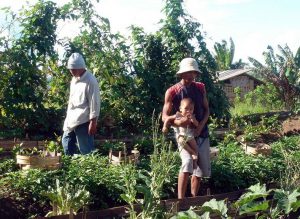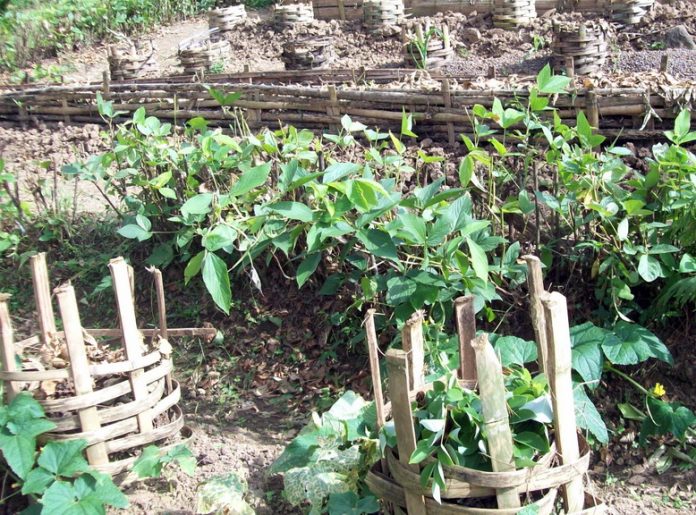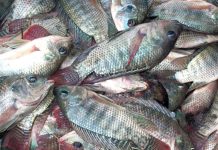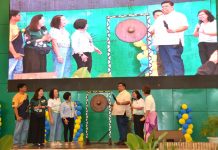From a swamp area where mechanics dumped trash to a place teeming with vegetable crops, fruit trees, herbs, ornamentals, livestock, fish and poultry today, the Peñalosa Farm has gone a long, long way indeed.
Located right at the back of a mall in the heart of Victorias City, the 0.9-hectare farm is one of the top agri-tourism destinations in Negros Occidental. “We can address the problem of poverty by teaching people about farming,” said Ramon Dayrit Peñalosa, Jr., the owner of the farm.
“Mr. Organic,” the moniker Peñalosa earned for venturing into organic farming and stuck to it like a glue, really never thought of becoming an agripreneur. When his former business, bus transport system, closed down, he was left with a property that was used before as garage and repair area for vehicles.
“We had to think of something that would make our property into something productive,” recalled organic guru and pillar of organic farming in Negros Island and Western Visayas. “So, we tried something far off from bus lines.”
In the beginning, he planted kangkong in the property, particularly near the water-logged areas. Later on, the whole area was swamped with kangkong. He decided to raise pigs, which he found out to be viable. He added more pigs and before he knew it, he was already raising 40 pigs all in all. He thought of raising tilapia, ducks and chickens. He planted fruit trees and vegetable crops.
 It was just a matter of time that he learned about integrated farming. From there, it was just a step away from organic agriculture.
It was just a matter of time that he learned about integrated farming. From there, it was just a step away from organic agriculture.
One of the banner programs of the Department of Agriculture, organic agriculture is “an agricultural production system that avoid or largely excludes the use of synthetically compounded fertilizers, growth regulators, pesticides, livestock feed additives, and genetically modified organisms and products,” informs Lucille Elna Parreno-de Guzman, author of the report, “Organic Agriculture: A SLM Strategy for LDN in the Philippines.”
SLM is an acronym for sustainable land management while LDN refers to land degradation neutrality. The latter is defined as “a state whereby the amount of healthy and productive land resources, necessary to support ecosystem services, remains stable or increases within specified temporal and spatial scales.”
Organic agriculture has been practiced in the Philippines since time immemorial but it was not until in 2010 that the government formalized by signing Republic Act No. 10068 or the Organic Act of 2010.
The Act encourages the farmers to adopt this sustainable farming technology throughout the country. The government has been mandated to “promote, propagate, develop further and implement the practice of organic agriculture in the Philippines that will cumulatively condition and enrich the fertility of the soil, increase farm productivity, reduce pollution and destruction of the environment, prevent the depletion of natural resources, further protect the health of farmers, consumers and the general public, and save on imported farm inputs.”
The report of Parreno-de Guzman is part of the cross-country research project, “Sustainable Land Management: Adoption and Implementation Constraints,” which was conducted with support from Economy and Environment Program for Southeast Asia (EEPSEA) and the ELD (Economics of Land Degradation) Initiative.
The Bureau of Soils and Water Management (BSWM) of the Department of Agriculture has identified organic agriculture as one of the systems that can combat land degradation. It does by helping improve soil fertility, preventing wind and water erosion of the soil, improving water infiltration and retention capacity, reducing surface and ground water consumption and subsequent soil salinization, and reducing ground and surface water contamination.
Parreno-de Guzman conducted her study at the municipalities of Liliw, Nagcarlan, Majayjay and Magdalena in Laguna and in La Trinidad in Benguet. She wanted to assess the land degradation situation in the aforementioned towns. “I also want to know if the farming systems they adopted help avoid, reduce or reverse land degradation,” she said.
According to the researcher, chemical pollution of soil and water bodies is the main land degradation issue in both provinces. “This is mainly due to the continuous and indiscriminate use of chemical inputs in farming,” she reported.
In her study, she found that organic agriculture has been practiced in La Trinidad 10 years earlier than those in Laguna. “Farmers who have converted to organic agriculture did so mainly due to observed and experienced negative health effects in using chemical fertilizers and pesticides,” she wrote.
Aside from agrochemicals, farmers in both provinces also apply raw or partially decomposed chicken manure as fertilizer.
“Although the use of chemical fertilizers, pesticides and chicken manure has had minimal effect on physical land degradation, its effect has been largely on the chemical properties of the soil and of surrounding water bodies,” Parreno-de Guzman wrote.
Although organic agriculture is one of the best methods in combating land degradation, Parreno-de Guzman observed there are certain issues that limits its widespread adoption. These are: knowledge-intensive (“no one recipe that fits all”), decrease in yield during conversion period (due to imbalance in soil nutrients), laborious production (when producing organic fertilizers and concoctions), high initial investment (particularly on vermicomposting or the production of organic fertilizer with the use of earthworms).
More importantly, there is a high cost of organic certification. Section 17 of RA 10068 said it bluntly: “Only third-party certification is allowed (for agricultural produce) to be labeled as organically produced.”
The report also provided six recommendations, among them: gradual conversion to avoid drastic reduction in yield; regulate the marketing and use of chemical fertilizers and pesticides; farmers to organize into associations to get government support; strong support from the academe; a niche market for organic produce; and organic certification be made affordable and accessible to small producers.
Meanwhile, Peñalosa believed that the success of his integrated organic farm is because of his belief in the Almighty, the Supreme Being who is the source of all knowledge. “A farmer who does not know how to pray,” he declared, “is not a good farmer.”







